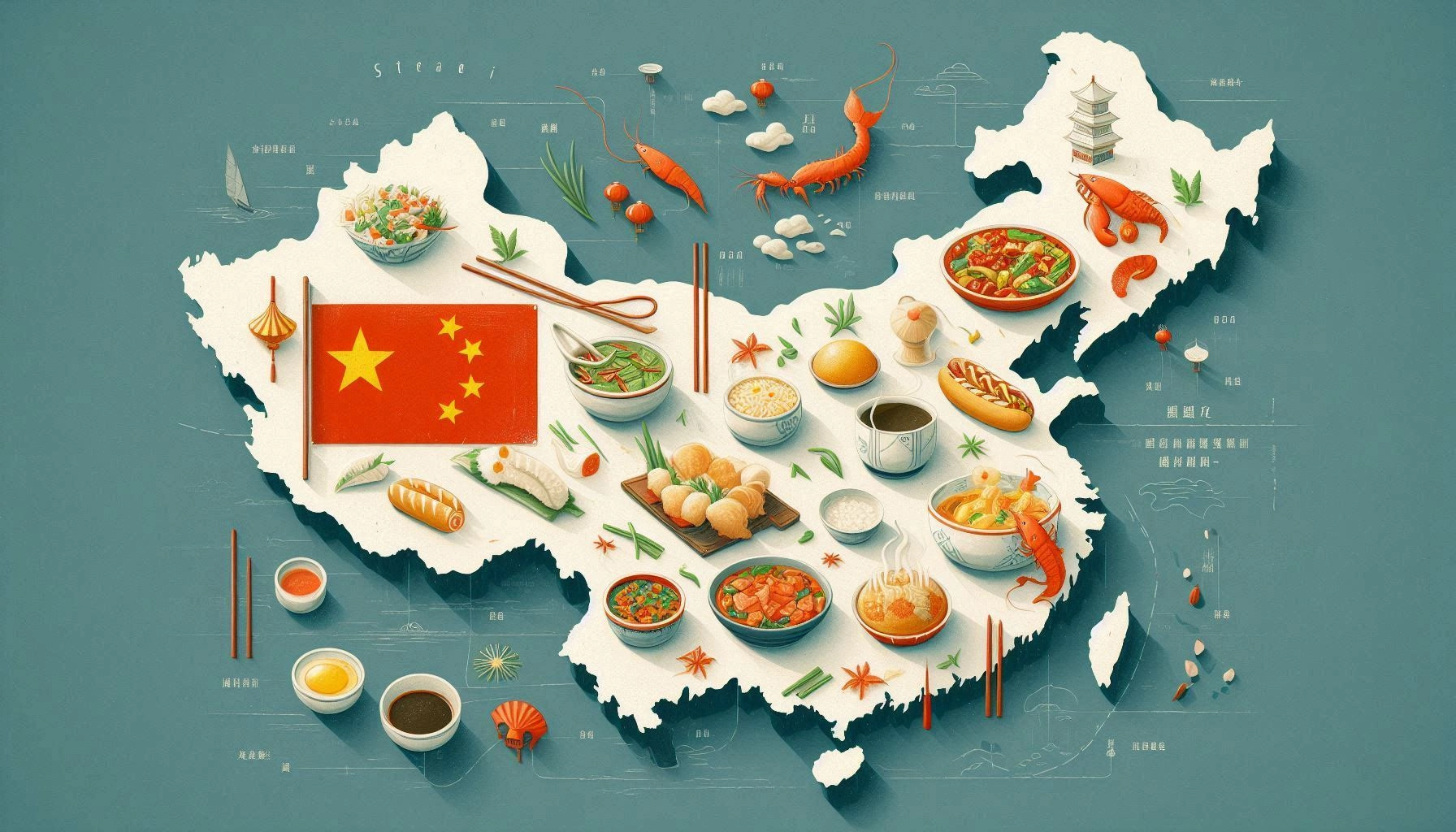For HSK learners, mastering Mandarin goes beyond memorizing characters and grammar rules. It's about immersing yourself in Chinese culture, and what better way to do that than through food? China's vast culinary landscape offers a unique opportunity to enhance your language skills while tantalizing your taste buds. Let's embark on a gastronomic journey that will not only satisfy your appetite but also boost your HSK preparation.

The Eight Great Traditions: A Linguistic Feast
China's cuisine is often categorized into eight major regional styles, known as the "Eight Great Traditions" (八大菜系, bā dà cài xì). Each region's unique flavors and cooking methods provide a rich context for expanding your HSK vocabulary and cultural knowledge.
-
Cantonese Cuisine (粤菜, yuè cài)
- Key vocabulary: 清蒸 (qīng zhēng, steamed), 点心 (diǎn xin, dim sum)
- Grammar focus: Measure words for different dim sum items
-
Sichuan Cuisine (川菜, chuān cài)
- Key vocabulary: 麻辣 (má là, numbing and spicy), 火锅 (huǒ guō, hot pot)
- Grammar focus: Descriptive adjectives for flavors
-
Shandong Cuisine (鲁菜, lǔ cài)
- Key vocabulary: 海鲜 (hǎi xiān, seafood), 炖 (dùn, to stew)
- Grammar focus: Cooking method verbs
-
Jiangsu Cuisine (苏菜, sū cài)
- Key vocabulary: 红烧 (hóng shāo, braised in soy sauce), 清淡 (qīng dàn, light and fresh)
- Grammar focus: Comparative sentences for taste descriptions
-
Zhejiang Cuisine (浙菜, zhè cài)
- Key vocabulary: 鲜美 (xiān měi, fresh and delicious), 西湖醋鱼 (xī hú cù yú, West Lake vinegar fish)
- Grammar focus: Adjective + noun combinations for dish names
-
Fujian Cuisine (闽菜, mǐn cài)
- Key vocabulary: 汤 (tāng, soup), 海鲜 (hǎi xiān, seafood)
- Grammar focus: Sentence structures for expressing preferences
-
Hunan Cuisine (湘菜, xiāng cài)
- Key vocabulary: 辣 (là, spicy), 烟熏 (yān xūn, smoked)
- Grammar focus: Adverbs of degree for describing spiciness
-
Anhui Cuisine (徽菜, huī cài)
- Key vocabulary: 野味 (yě wèi, wild game), 烧烤 (shāo kǎo, barbecue)
- Grammar focus: Passive voice for cooking methods
Culinary Vocabulary: Essential Ingredients for HSK Success
As you explore China's foodie map, you'll encounter a wealth of vocabulary that's crucial for HSK success. Here's a list of essential food-related terms to incorporate into your studies:
- 食材 (shí cái) - ingredients
- 调味料 (tiáo wèi liào) - seasonings
- 烹饪方法 (pēng rèn fāng fǎ) - cooking methods
- 餐具 (cān jù) - tableware
- 菜单 (cài dān) - menu
- 口味 (kǒu wèi) - taste preference
- 营养 (yíng yǎng) - nutrition
- 食品安全 (shí pǐn ān quán) - food safety
Grammar Through Gastronomy: Digesting Chinese Sentence Structures
Chinese cuisine offers an excellent context for practicing various grammar points. Here are some examples:
-
Comparatives and Superlatives
- 四川菜比广东菜辣。(Sìchuān cài bǐ Guǎngdōng cài là.)
- Sichuan cuisine is spicier than Cantonese cuisine.
-
Resultative Complements
- 我吃饱了。(Wǒ chī bǎo le.)
- I've eaten until I'm full.
-
Potential Complements
- 这道菜太辣,我吃不了。(Zhè dào cài tài là, wǒ chī bù liǎo.)
- This dish is too spicy; I can't eat it.
-
把 (bǎ) Sentence Structure
- 请把盐递给我。(Qǐng bǎ yán dì gěi wǒ.)
- Please pass me the salt.
-
被 (bèi) Passive Voice
- 这道菜被厨师做得很好吃。(Zhè dào cài bèi chú shī zuò de hěn hǎo chī.)
- This dish was made very deliciously by the chef.
Cultural Bites: Enhancing Your HSK Reading Comprehension
Understanding Chinese food culture can significantly improve your reading comprehension skills for the HSK test. Here are some cultural aspects to explore:
-
Traditional Chinese Medicine and Food: Learn about the concept of 食疗 (shí liáo, food therapy) and how certain ingredients are believed to have medicinal properties.
-
Festival Foods: Research the symbolic meanings behind foods eaten during Chinese festivals, such as 月饼 (yuè bing, mooncakes) for the Mid-Autumn Festival or 饺子 (jiǎo zi, dumplings) for Chinese New Year.
-
Tea Culture: Delve into the rich history and varieties of Chinese tea, an essential component of Chinese cuisine and social interactions.
-
Dining Etiquette: Familiarize yourself with Chinese table manners and customs, which often appear in HSK reading passages.
Practical Tips for HSK Learners
-
Create a Food Diary: Keep a journal in Chinese about the dishes you try, describing flavors, ingredients, and your opinions.
-
Cook Chinese Dishes: Follow recipes in Chinese to practice reading comprehension and learn new vocabulary in context.
-
Watch Chinese Cooking Shows: Improve your listening skills while learning about Chinese cuisine and culture.
-
Visit Chinese Restaurants: Practice ordering in Mandarin and engage in conversations about food with native speakers.
-
Join Online Food Communities: Participate in Chinese-language forums or social media groups dedicated to Chinese cuisine.
Conclusion: A Recipe for HSK Success
Exploring China's foodie map is not just a culinary adventure; it's a comprehensive approach to mastering Mandarin and preparing for the HSK test. By immersing yourself in the rich tapestry of Chinese cuisine, you'll naturally absorb vocabulary, grammar structures, and cultural knowledge essential for HSK success. Remember, language learning should be as enjoyable as it is educational – so grab your chopsticks and let your taste buds guide you through the delicious world of Chinese language and culture!
As you continue your HSK journey, keep in mind that every meal is an opportunity to expand your linguistic palate. From the fiery flavors of Sichuan to the delicate tastes of Cantonese cuisine, each bite brings you closer to fluency and cultural understanding. So, dive into China's culinary landscape and watch your HSK skills simmer, sauté, and soar to new heights!